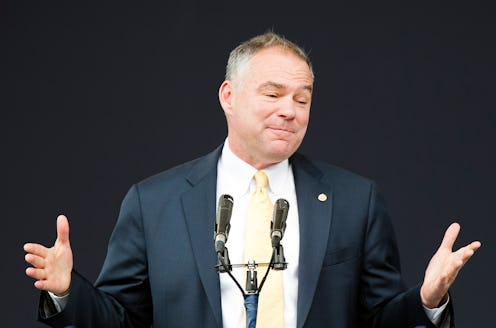On Friday, presumptive Democratic nominee Hillary Clinton named Virginia Sen. Tim Kaine as her running mate in a much-anticipated email to her supporters. Kaine emerged as her likely VP pick in the past few days, though Massachusetts Sen. Elizabeth Warren, New Jersey Sen. Cory Booker, former Iowa Gov. Tom Vilsack, and multiple others were all on Clinton's shortlist. Some liberals are wary of Kaine's record on global trade deals, but where does Tim Kaine stand on reproductive rights? Despite a 100 percent rating from Planned Parenthood as a senator, Kaine's personal opposition to abortion has been called into question.
A devout Catholic, Kaine is personally opposed to abortion, but in a recent interview with CNN, he reiterated that he supported Roe v. Wade, and clarified that he doesn't think the government should interfere with "people's reproductive decisions." He has also consistently voted down the GOP's efforts to defund Planned Parenthood. That being said, he has previously supported "parental consent" measures for abortions — unless a judge waives the requirement — and "informed consent" rules requiring abortion providers to educate people on adoption and other options before proceeding. Additionally, he has in the past supported a ban on late-term abortions, except when the life and health of the pregnant person are at stake.
In 2009, Kaine drew criticism from reproductive rights groups both in Virginia and nationally when he signed a law to permit the sale of "Choose Life" license plates. Kaine subsequently argued that he was advocating for free speech, but reproductive rights groups pointed out that the law would give money to pro-life organizations. Even before that, when he was running to be Virginia's governor back in 2005, he promised to promote adoption and abstinence-focused education in order to reduce the number of abortions performed in the state.
Clinton's VP pick has therefore incited some confusion among progressives, who see Clinton as a champion of reproductive rights. Pro-choice organizations like NARAL, which endorsed Clinton, had hoped that her running mate would similarly fight for reproductive justice. Some people pointed out this discrepancy on Twitter, and urged Clinton supporters to hold Kaine accountable.
Writing for Slate, Nora Caplan-Bricker went so far as to argue that Clinton is "testing feminists' loyalty" by picking Kaine. This is an important point: Even if Kaine defends Planned Parenthood and Roe v. Wade, pro-choice feminists can still be wary of his "personal" or "moral" opposition to abortion. However, some people disagree that Kaine's record on this issue makes him a questionable choice, pointing out that Vice President Joe Biden is also personally opposed to abortion while defending an individual's right to choose what is best for them.
It's an interesting dilemma for Clinton, who would have likely faced criticism regardless of whom she picked to be her VP. Had she picked Warren — a favorite among progressives — or Ohio Sen. Sherrod Brown, she would have stirred some controversy among Wall Street groups, and now that she has picked Kaine, she will probably hear from dissatisfied Sanders supporters. With the Democratic National Convention set to begin on Monday, we will likely get a better understanding of what kind of VP Kaine will be soon enough.
